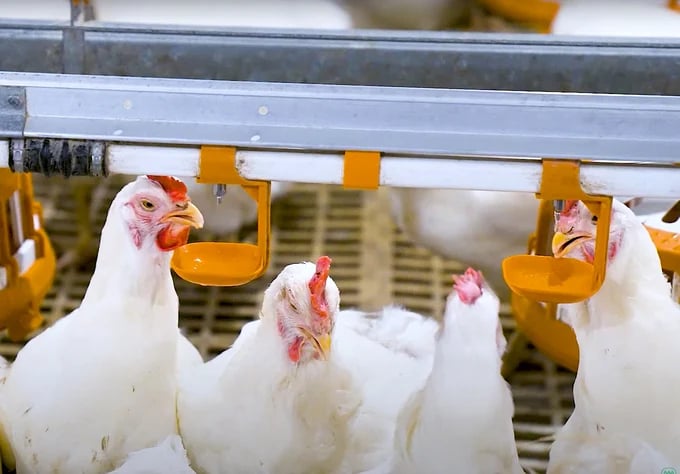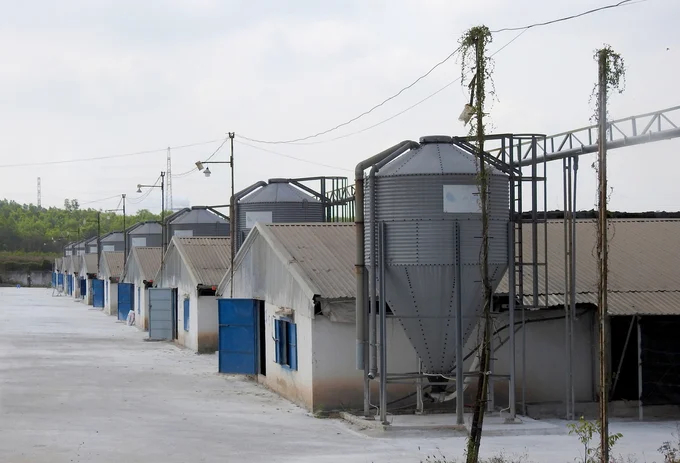June 16, 2025 | 00:31 GMT +7
June 16, 2025 | 00:31 GMT +7
Hotline: 0913.378.918
June 16, 2025 | 00:31 GMT +7
Hotline: 0913.378.918

Chickens drink water through an automatic watering system on a farm in Dong Nai. Photo: Son Trang.
According to the Dong Nai Department of Agriculture and Rural Development, Dong Nai’s livestock industry is relatively large, with two main types of livestock: pigs and chickens. To date, Dong Nai has a total herd of 2.1 million pigs and 23 million chickens, of which farm livestock accounts for 90% of the total herd.
Mr. Nguyen Van Thang, Deputy Director of the Dong Nai Department of Agriculture and Rural Development, said that Dong Nai is one of the key industrial-scale livestock areas of the country. Therefore, production components in the livestock sector have many opportunities to access science and technology. In particular, the large scale of livestock farms is favorable for applying mechanization and automation in Dong Nai livestock farming.
Information from the People’s Committee of Tan Phu district shows that there are currently 58 farm-scale livestock facilities. Of these, 30% of pigs and 100% of poultry farms have built closed cage systems, biological bedding, wastewater treatment, and livestock waste systems according to industry standards. They have also applied automatic and semi-automatic feeding troughs and drinking troughs.
In the small livestock area, over 80% of establishments in Tan Phu are equipped with automatic and semi-automatic feeding troughs, drinking troughs, biological mats, and waste treatment systems. These applications ensure hygiene regulations of veterinary medicine and environmental protection.
Based on mechanization in livestock farming in the area, the People’s Committee of Tan Phu district affirmed that promoting mechanization in livestock farming has created conditions for livestock farmers to develop large-scale herds, moving towards livestock farming according to national standards. Farmers aim towards the commodity industry, contributing to minimizing the limitations of traditional manual livestock farming, significantly limiting risks caused by epidemics. Besides, farmers can also manage and monitor the process of food use, reproduction, and animal health.
In Xuan Loc district, the percentage of mechanization in collecting and cleaning barns reached 60%, and the percentage of mechanization in the cooling stage reached 70%. In general, the application of mechanization in livestock farming in Xuan Loc has completely replaced manual work.

A large-scale chicken farm in Vinh Cuu district, Dong Nai. Photo: Son Trang.
Generally, in the entire livestock industry of Dong Nai, stages of animal feed processing (crushing, mixing, mincing) and cleaning of barns are primarily mechanized. The rate of mechanization of the barn cooling system reaches 50%. 21% of livestock farms use cold, closed barns; 11.5% of farms apply automation technology in adjusting temperature and humidity in cages, providing food, drinking water, collecting waste, and collecting eggs. Nearly 90% of livestock farms have waste treatment systems that ensure compliance with environmental protection commitments.
In Dong Nai, there are currently many typical models for applying high technology to the management and organization of livestock production. One of the typical models is the Long Thanh Phat High-tech Agricultural Cooperative in the Long Thanh district. This is the leading unit in building cold farms to raise chickens in Dong Nai with a high level of automation, from cooling to adjusting light, temperature, humidity, feeding, drinking water, giving medicine, etc. Long Thanh Phat’s chicken farms also have conveyor systems to catch chickens and automatically take chicken manure as raw materials for organic fertilizer production.
This chicken farm is located separate from the residential area, surrounded by melaleuca forest. Chickens are raised in cold farms for export to Japan. The farm operates completely automatically in all stages of feeding and drinking. Workers here closely monitor the chicken flock to handle when the chickens show signs of health abnormalities promptly.
The farm uses rice husks as biological bedding combined with probiotics to reduce odors and harmful bacteria to treat manure. Workers caring for chickens must be trained in procedures and livestock knowledge. Each chicken farm has a doctor caring for the animal’s food and sleep.
In Vinh Cuu district, Trinh Dang Khoi chicken farm has applied a system of machines to collect and classify eggs, and collect chicken manure as raw materials for organic fertilizer production. Trinh Dang Khoi chicken farm’s organic fertilizer is included in the list of fertilizers allowed to circulate in Vietnam and is supplied to the market.
Mr. Nguyen Van Thang assessed that Dong Nai province’s livestock sector has a high level of mechanization, from food production and processing to barn cleaning and livestock management. Many farms have invested in equipment to automate each step and the livestock-raising process. This is the premise for implementing automation in the livestock sector in the next stage.
Translated by Quynh Chi
/2025/06/12/3721-2-202745_83.jpg)
(VAN) TH made an impression at Seoul Food 2025 with its line of natural beverages, paving the way for Vietnamese food products to enter the South Korean market.

(VAN) Soc Trang's success in rice exports stems from a strategy of developing fragrant and specialty rice cultivation areas and standardizing production toward low-emission practices.
/2025/06/11/1311-5-120811_839.jpg)
(VAN) The pig farming industry is facing the challenge of comprehensive restructuring to meet requirements for quality, safety, traceability, and market expansion both domestically and for export.

(VAN) Vietnam considers participating in ALGROALBA in order to expand agricultural production, coordinate the assessment and effective exploitation potential land.
/2025/06/05/5314-1-184727_407.jpg)
(VAN) From seemingly worthless fish scales and skin, enzymes and lactic ferments can transform by-products into peptides, opening a sustainable, effective business direction and elevating Vietnamese seafood.

(VAN) TTC AgriS and IFC signed a strategic partnership to develop a sustainable agricultural value chain, aiming to achieve the Net Zero target by 2035.

(VAN) Seafood by-products are opening a new path, combining green growth and technological innovation to enhance the industry's value.